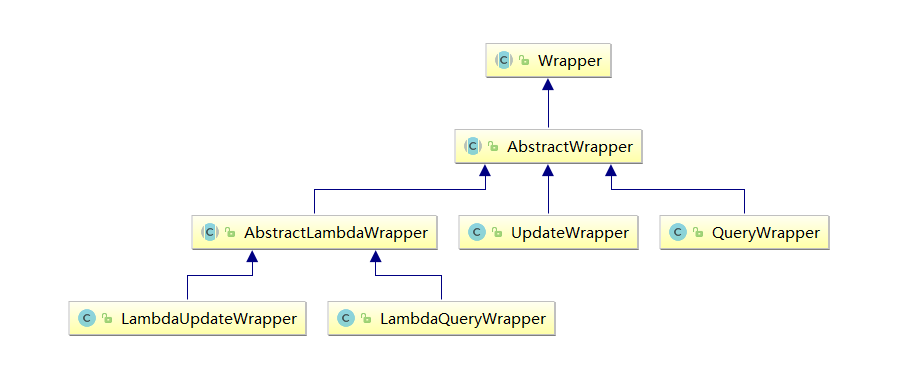1, Introduction to wapper
1. Wrapper family
In MP, we can use general Mapper (BaseMapper) to implement basic queries, or use custom Mapper (custom XML) to implement more advanced queries. Of course, you can also combine conditional constructors to facilitate more advanced queries.

Wrapper: conditional construction abstract class, topmost parent class
AbstractWrapper: used to encapsulate query conditions and generate sql where conditions
QueryWrapper: query condition encapsulation
UpdateWrapper: Update conditional encapsulation
AbstractLambdaWrapper: use Lambda syntax
LambdaQueryWrapper: a query Wrapper used for Lambda syntax
Lambda updatewrapper: LambdaUpdateWrapper
2. Create test class
@SpringBootTest
public class WrapperTests {
@Resource
private UserMapper userMapper;
}
2, QueryWrapper
1. Example 1: assembly query criteria
Query the user whose name contains n, age is greater than or equal to 10 and less than or equal to 20, and email is not empty
@Test
public void test1() {
QueryWrapper<User> queryWrapper = new QueryWrapper<>();
queryWrapper
.like("name","n")
.between("age", 10, 20)
.isNotNull("email");
List<User> users = userMapper.selectList(queryWrapper);
users.forEach(System.out::println);
}
2. Example 2: assembly sorting conditions
Query users by age in descending order. If they are the same age, they are sorted by id in ascending order
@Test
public void test2() {
QueryWrapper<User> queryWrapper = new QueryWrapper<>();
queryWrapper
.orderByDesc("age")
.orderByAsc("id");
List<User> users = userMapper.selectList(queryWrapper);
users.forEach(System.out::println);
}
3. Example 3: assembly deletion condition
Delete users whose email is empty
@Test
public void test3() {
QueryWrapper<User> queryWrapper = new QueryWrapper<>();
queryWrapper.isNull("email");
int result = userMapper.delete(queryWrapper); //The condition constructor can also build conditions for deleting statements
System.out.println("delete return count = " + result);
}
4. Example 4: priority of condition
Query the users whose name contains n and whose age is less than 18 or whose email is empty, and set their age to 18 and their email to user@atguigu.com
@Test
public void test4() {
//modify condition
QueryWrapper<User> queryWrapper = new QueryWrapper<>();
queryWrapper
.like("name", "n")
.and(i -> i.lt("age", 18).or().isNull("email")); //Logical priority operation in lambda expression
User user = new User();
user.setAge(18);
user.setEmail("user@atguigu.com");
int result = userMapper.update(user, queryWrapper);
System.out.println(result);
}
5. Example 5: assemble the select clause
Query the user names and ages of all users
@Test
public void test5() {
QueryWrapper<User> queryWrapper = new QueryWrapper<>();
queryWrapper.select("name", "age");
//selectMaps() returns the Map collection list, which is usually used in conjunction with select() to avoid null column values not found in the User object
List<Map<String, Object>> maps = userMapper.selectMaps(queryWrapper);//The return value is the Map list
maps.forEach(System.out::println);
}
6. Example 6: implement sub query
Query the id list of all users whose id is not greater than 3
@Test
public void test6() {
QueryWrapper<User> queryWrapper = new QueryWrapper<>();
queryWrapper.inSql("id", "select id from user where id <= 3");
//Usage scenario of selectObjs: only one column is returned
List<Object> objects = userMapper.selectObjs(queryWrapper);//The return value is the Object list
objects.forEach(System.out::println);
}
However, the above method is easy to trigger sql injection
queryWrapper.inSql("id", "select id from user where id <= 3 or true"); // Or insert all user IDs
Instead, use the following query method
queryWrapper.in("id", 1, 2, 3 );
// or
queryWrapper.le("id", 3 );
3, UpdateWrapper
Example 7: the requirements are the same as example 4
Query the users whose name contains n and whose age is less than 18 or whose email is empty, and set their age to 18 and their email to user@hguo.com
@Test
public void test7() {
//Assemble set clause
UpdateWrapper<User> updateWrapper = new UpdateWrapper<>();
updateWrapper
.set("age", 18)
.set("email", "user@atguigu.com")
.like("name", "n")
.and(i -> i.lt("age", 18).or().isNull("email")); //Logical priority operation in lambda expression
//You must create a User object here, or auto fill cannot be applied. If there is no auto fill, it can be set to null
User user = new User();
int result = userMapper.update(user, updateWrapper);
System.out.println(result);
}
4, condition
Example 8: dynamic assembly query criteria
The query name contains n, users older than 10 and less than 20. The query criteria are from user input and are optional
@Test
public void test8() {
//Define query criteria, which may be null (not entered by the user)
String name = null;
Integer ageBegin = 10;
Integer ageEnd = 20;
QueryWrapper<User> queryWrapper = new QueryWrapper<>();
if(StringUtils.isNotBlank(name)){
queryWrapper.like("name","n");
}
if(ageBegin != null){
queryWrapper.ge("age", ageBegin);
}
if(ageEnd != null){
queryWrapper.le("age", ageEnd);
}
List<User> users = userMapper.selectList(queryWrapper);
users.forEach(System.out::println);
}
The above implementation scheme has no problem, but the code is complex. We can use the overload method with condition parameter to build query conditions and simplify the writing of code
@Test
public void test8Condition() {
//Define query criteria, which may be null (not entered by the user)
String name = null;
Integer ageBegin = 10;
Integer ageEnd = 20;
QueryWrapper<User> queryWrapper = new QueryWrapper<>();
queryWrapper
.like(StringUtils.isNotBlank(name), "name", "n")
.ge(ageBegin != null, "age", ageBegin)
.le(ageEnd != null, "age", ageEnd);
List<User> users = userMapper.selectList(queryWrapper);
users.forEach(System.out::println);
}
5, Lambdaxwrapper
1. Example 9: Query - requirements are the same as example 8
@Test
public void test9() {
//Define query criteria, which may be null (not entered by the user)
String name = null;
Integer ageBegin = 10;
Integer ageEnd = 20;
LambdaQueryWrapper<User> queryWrapper = new LambdaQueryWrapper<>();
queryWrapper
//Avoid using strings to represent fields and prevent runtime errors
.like(StringUtils.isNotBlank(name), User::getName, "n")
.ge(ageBegin != null, User::getAge, ageBegin)
.le(ageEnd != null, User::getAge, ageEnd);
List<User> users = userMapper.selectList(queryWrapper);
users.forEach(System.out::println);
}
2. Example 10: Update - requirements are the same as example 4
@Test
public void test10() {
//Assemble set clause
LambdaUpdateWrapper<User> updateWrapper = new LambdaUpdateWrapper<>();
updateWrapper
.set(User::getAge, 18)
.set(User::getEmail, "user@atguigu.com")
.like(User::getName, "n")
.and(i -> i.lt(User::getAge, 18).or().isNull(User::getEmail)); //Logical priority operation in lambda expression
User user = new User();
int result = userMapper.update(user, updateWrapper);
System.out.println(result);
}